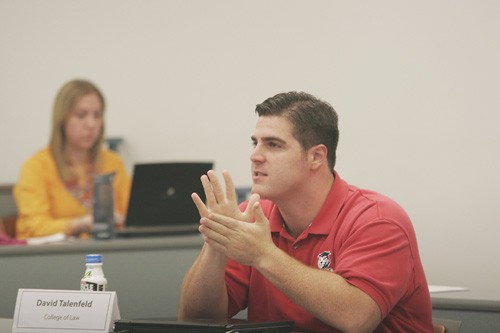Graduate student leaders hit their first minor stumbling block on the path to a graduate student bill of rights at their meeting Wednesday evening.
Representatives from faculty and administrative governance bodies addressed the Graduate and Professional Student Council about a specific item — a clause concerning the formation of a grievance management committee — of the current draft of the bill of rights, saying that it could conflict with pre-existing grievance policies.
“”There’s a long history of grievance policies. It’s quite complex,”” said Andrew Carnie, linguistics professor and chair of the Graduate Council, a faculty body that oversees academic policies for graduate students.
Rather than adjusting the grievance policy stated in the bill, Carnie instead offered revisions to the pre-existing Graduate College grievance policy that would give graduate students more representation on the grievance committee.
The step is necessary to avoid creating governing bodies that unintentionally usurp the pre-existing power of other bodies, Carnie said.
GPSC President David Talenfeld, a second-year law student, originally supported the formation of a new grievance committee, outlined in the bill of rights draft, because he said there was a need for a more efficient grievance redress committee than the one that currently exists in the Graduate College.
“”Unfortunately, they’re coming to us recently and saying ‘I have this issue, I’m stuck in the grievance policy, and I don’t feel like I’m being listened to,'”” Talenfeld said.
Dianne Horgan, associate dean of the Graduate College, dismissed the accusations, saying that the current body was capable of handling the volume of complaints it normally receives.
“”It’s sort of impossible to be stuck in the grievance process because they have to formally file, so I would know. As far as I know, there’s no one who’s stuck in the grievance process,”” Horgan said.
The problem for some students, she said, is that their complaints are sometimes affected by a number of different policies, which might cause them to have to visit a number of offices to have their issue resolved. Unfortunately, she said, this difficulty is inherent in the nature of the grievance redress process.
“”(People say) ‘why can’t we have a one-stop grievance procedure?’ Well, the reason is the grievances become very complex,”” she said. “”It’s very rare that someone comes in with a uni-dimensional problem.””
GPSC representatives seemed amenable to the proposed compromise, which Talenfeld called, “”exciting.”” As GPSC leaders attempt to gather endorsements for the bill of rights, it will be important to be flexible with the various stakeholders, including the Graduate Council and the Faculty Senate, whose support will be necessary before President Robert Shelton will ultimately approve the official policy, Talenfeld said.
“”They’re the people in a position to sort of whisper in administrators’ ears,”” he said.
In coming weeks, GPSC can expect to see the details and wording of its bill undergo many more modifications before these stakeholders can endorse it, Horgan said.
“”I love to simplify policies, but this one … can’t be as simple as you might think,”” she said.









